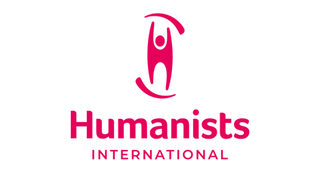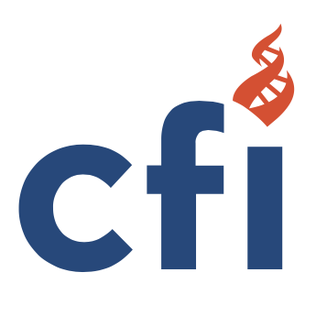
Secular humanism is a philosophy, belief system, or life stance that embraces human reason, logic, secular ethics, and philosophical naturalism, while specifically rejecting religious dogma, supernaturalism, and superstition as the basis of morality and decision-making.

Paul Kurtz was an American scientific skeptic and secular humanist. He has been called "the father of secular humanism". He was Professor Emeritus of Philosophy at the State University of New York at Buffalo, having previously also taught at Vassar, Trinity, and Union colleges, and the New School for Social Research.

Humanist Manifesto is the title of three manifestos laying out a humanist worldview. They are the original A Humanist Manifesto, the Humanist Manifesto II (1973), and Humanism and Its Aspirations: Humanist Manifesto III (2003). The original manifesto originally arose from religious humanism, though secular humanists also signed.
A Humanist Manifesto, also known as Humanist Manifesto I to distinguish it from later Humanist Manifestos in the series, was written in 1933 primarily by Raymond Bragg and published with 34 signers. Unlike the later manifestos, this first talks of a new religion and refers to humanism as "the religion of the future." Nevertheless, it is careful not to express a creed or dogma. The document outlines fifteen affirmations on cosmology, biological and cultural evolution, human nature, epistemology, ethics, religion, self-fulfillment, and the quest for freedom and social justice. This latter, stated in article fourteen, proved to be the most controversial, even among humanists, in its opposition to "acquisitive and profit-motivated society" and its demand for an egalitarian world community based on voluntary mutual cooperation. The document's release was reported by the mainstream media on May 1, simultaneous with its publication in the May/June 1933 issue of the New Humanist.
Humanism and Its Aspirations is the most recent of the Humanist Manifestos, published in 2003 by the American Humanist Association (AHA). The newest one is much shorter, listing six primary beliefs, which echo themes from its predecessors:

Herbert Aaron Hauptman was an American mathematician and Nobel laureate. He pioneered and developed a mathematical method that has changed the whole field of chemistry and opened a new era in research in determination of molecular structures of crystallized materials. Today, Hauptman's direct methods, which he continued to improve and refine, are routinely used to solve complicated structures. It was the application of this mathematical method to a wide variety of chemical structures that led the Royal Swedish Academy of Sciences to name Hauptman and Jerome Karle recipients of the 1985 Nobel Prize in Chemistry.

Humanists International is an international non-governmental organisation championing secularism and human rights, motivated by secular humanist values. Founded in Amsterdam in 1952, it is an umbrella organisation made up of more than 160 secular humanist, atheist, rationalist, agnostic, skeptic, freethought and Ethical Culture organisations from over 80 countries.
Prometheus Books is a publishing company founded in August 1969 by the philosopher Paul Kurtz. The publisher's name was derived from Prometheus, the Titan from Greek mythology who stole fire from Zeus and gave it to man. This act is often used as a metaphor for bringing knowledge or enlightenment.

The Center for Inquiry (CFI) is a U.S. nonprofit organization that works to mitigate belief in pseudoscience and the paranormal and to fight the influence of religion in government.

Free Inquiry is a bimonthly journal of secular humanist opinion and commentary published by the Council for Secular Humanism, a program of the Center for Inquiry. Philosopher Paul Kurtz was the editor-in-chief from its inception in 1980 until stepping down in 2010. Kurtz was succeeded by Tom Flynn who worked as Editor in Chief until 2021. Paul Fidalgo was named editor in 2022, beginning with the October/November issue. Feature articles cover a wide range of topics from a freethinking perspective. Common themes are separation of church and state, science and religion, dissemination of freethought, and applied philosophy. Regular contributors include well-known scholars in the fields of science and philosophy.

The Humanist Institute is a training program for leaders within the humanist, and secular humanist movement.

Humanism is a philosophical stance that emphasizes the individual and social potential, and agency of human beings, whom it considers the starting point for serious moral and philosophical inquiry.

Fred Edwords, born July 19, 1948, in San Diego, California, is an agnostic or ignostic humanist leader in Washington DC.

Thomas W. Flynn was an American author, journalist, novelist, executive director of the Council for Secular Humanism, and editor of its journal Free Inquiry. He was also director of the Robert Green Ingersoll Birthplace Museum and the Freethought Trail.

The Birmingham Humanist Group was formed on 23 May 1962 at the Arden Hotel, New Street, Birmingham, England, at a meeting convened by Dr Anthony Brierley. It changed its name to Birmingham Humanists in 2000 and voted to become a Partner Group of the BHA, which changed its name to Humanists UK in 2017. It holds most of its meetings at the rooms of the Community Development trust in Moseley, Birmingham.
Timothy J. Madigan is an American philosopher, author and editor, and a noted humanist. He is particularly notable for having been the Editor of Free Inquiry, a leading journal of secular humanist discussion and commentary.

Ronald A. Lindsay was president and CEO of the Center for Inquiry and of its affiliates, the Council for Secular Humanism and the Committee for Skeptical Inquiry. He held this position June 2008 – 2016.
Gordon Stein was an American author, physiologist, and activist for atheism and religious skepticism.
Donald Arthur Hatch was a Canadian agrologist, aviator, writer, and humanist lecturer, born in Guelph, Ontario, Canada. He was the author of numerous scholarly articles published in various Canadian journals. He was also the author of a thought-provoking work on philosophy and religion entitled The Road Not Travelled: How the Democracy, Science and Humanism of the Greeks Was Suppressed by the Early Christian Church and How That Obstructed the Progress of Humanity. The thoughts expressed therein are generally consonant with the credo of Humanist Canada, and other humanist associations around the world.










